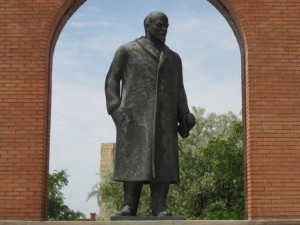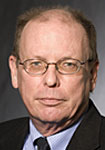 The indefatigable Ralph Nader came, he saw, he sold some books, and he raised some hell. Are you wasting the prime of your life with hang ups you should have dealt with as a teenager? Do you find yourself spending more time looking at yourself in the mirror than keeping tabs on Congress? Mr. Nader isn’t shy about asking the tough questions.
The indefatigable Ralph Nader came, he saw, he sold some books, and he raised some hell. Are you wasting the prime of your life with hang ups you should have dealt with as a teenager? Do you find yourself spending more time looking at yourself in the mirror than keeping tabs on Congress? Mr. Nader isn’t shy about asking the tough questions.
I was amazed and surprised with his digression on the 1872 Mining Law and his browbeating of the audience about our ignorance of the statute and its implications. Having done some research on the subject myself, I would put the ball back in his court. Does he know that environmental group opposition is stifling volunteer cleanups of abandoned mines? In this month’s Atlantic Monthly there is a short piece describing the situation. The basic problem is that there is a single policy instrument in place to prevent pollution and to govern cleanups. It turns out, this is like throwing one stone at two birds:
But as these volunteers prepare to tackle the main source of the pollution, the mines themselves, they face an unexpected obstacle—the Clean Water Act. Under federal law, anyone wanting to clean up water flowing from a hard-rock mine must bring it up to the act’s stringent water-quality standards and take responsibility for containing the pollution—forever. Would-be do-gooders become the legal “operators” of abandoned mines like those near Silverton, and therefore liable for their condition. In mid-October, Senator Mark Udall of Colorado introduced a bill that would allow such “good Samaritans” to obtain, under the Clean Water Act, special mine-cleanup permits that would protect them from some liability. Previous good-Samaritan bills have met opposition from national environmental organizations, including the Sierra Club, the Natural Resources Defense Council, and even the American Bird Conservancy, for whom any weakening of Clean Water Act standards is anathema.
In other words, it is the environmental groups who are standing in the way of environmental progress in this case. The reasons for this are straightforward, predictable, and understandable. It is all described cogently in this testimony on similar proposed legislation from ten years ago!
The sad state of affairs is that as the various groups dig in their heels, the acid drainage continues to pollute the waters in the west. Again, from The Atlantic:
Just a few miles from Silverton, in an icy valley creased with avalanche chutes, groundwater burbles out of the long-abandoned Red and Bonita gold mine. Loaded with aluminum, cadmium, and lead, it pours downhill, at 300 gallons a minute, into an alpine stream. The Silverton volunteers aren’t expecting a federal windfall anytime soon—even Superfund-designated mine sites have waited years for cleanup funding, and Udall’s bill has been held up in a Senate committee since last fall. Without a good-Samaritan provision to protect them from liability, they have few choices but to watch the Red and Bonita, and the rest of their local mines, continue to drain.
 One-time Presidential spoiler (just don’t tell him that) and always consumer-rights advocate (though economists might sometimes disagree) Ralph Nader will visit campus Sunday to deliver “The Great Conversion: Environmentalism over Corporatism.” The show is in the Chapel at 7:30, and Mr. Nader will be around to talk and sign books before and after his talk.
One-time Presidential spoiler (just don’t tell him that) and always consumer-rights advocate (though economists might sometimes disagree) Ralph Nader will visit campus Sunday to deliver “The Great Conversion: Environmentalism over Corporatism.” The show is in the Chapel at 7:30, and Mr. Nader will be around to talk and sign books before and after his talk.

 In today’s Wall Street Journal, Gerald O’Driscoll spells out on how theft and fraud have become commonplace. This is not a new story but a growing phenonmenon. The Goldman-Sachs and Lehman cases show how pervasive things are. The cartoon tells it all.
In today’s Wall Street Journal, Gerald O’Driscoll spells out on how theft and fraud have become commonplace. This is not a new story but a growing phenonmenon. The Goldman-Sachs and Lehman cases show how pervasive things are. The cartoon tells it all.

 Lawrence alum, George B. Wyeth, will kick off the Povolny Lecture Series this Tuesday, April 20, at 7 p.m. in Science Hall 102. Mr. Wyeth picked up his B.A. from Lawrence back in 1973, notably serving as editor-in-chief of The Lawrentian. He leveraged his success here into a Masters in Public Policy at UC-Berkeley and a law degree from Yale. After a stint in the private sector, he joined the U.S. Environmental Protection Agency in 1989 and is now the Director at the National Center for Environmental Innovation.
Lawrence alum, George B. Wyeth, will kick off the Povolny Lecture Series this Tuesday, April 20, at 7 p.m. in Science Hall 102. Mr. Wyeth picked up his B.A. from Lawrence back in 1973, notably serving as editor-in-chief of The Lawrentian. He leveraged his success here into a Masters in Public Policy at UC-Berkeley and a law degree from Yale. After a stint in the private sector, he joined the U.S. Environmental Protection Agency in 1989 and is now the Director at the National Center for Environmental Innovation. So, did Major League Baseball’s steroid craze lead to the decimation of the baseball record book? The argument is straight forward enough, with the help of performance-enhancing drugs, hitters got bigger and stronger and started knocking the tater out of the park with alarming frequency. The extra-ordinary seasons from the likes of Mark McGwire, Sammy Sosa, and Barry Bonds are the proof in the steroid pudding.
So, did Major League Baseball’s steroid craze lead to the decimation of the baseball record book? The argument is straight forward enough, with the help of performance-enhancing drugs, hitters got bigger and stronger and started knocking the tater out of the park with alarming frequency. The extra-ordinary seasons from the likes of Mark McGwire, Sammy Sosa, and Barry Bonds are the proof in the steroid pudding.
 If you have even an inkling of interest the financial markets coordination of savings and investment, the regulation (or absence thereof) of the financial sector, or even a career in that field, you should think about coming out. (This couldn’t come at a better time for my 240 class, which is learning about the Stigler-Peltzman
If you have even an inkling of interest the financial markets coordination of savings and investment, the regulation (or absence thereof) of the financial sector, or even a career in that field, you should think about coming out. (This couldn’t come at a better time for my 240 class, which is learning about the Stigler-Peltzman Week three of the Spring term is shaping up to be a busy one for the economics crowd. On Monday we have our usual Economics T
Week three of the Spring term is shaping up to be a busy one for the economics crowd. On Monday we have our usual Economics T